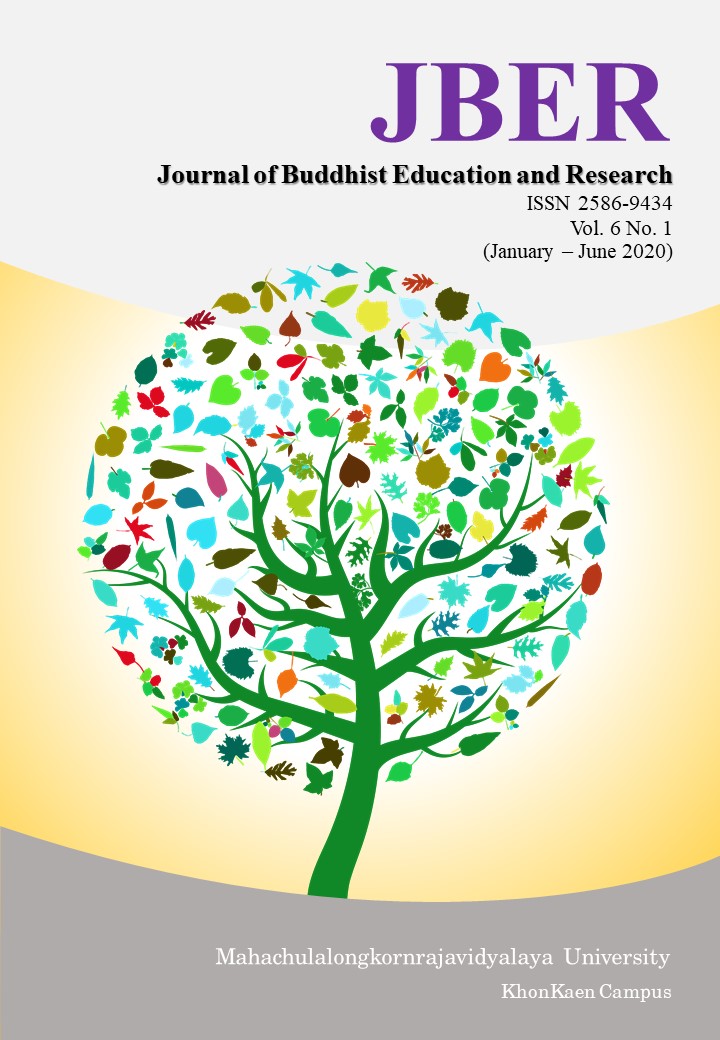LEARNING MANAGEMENT BASED ON THE FOUR IDDHIPADA TO ENHANCE EFFICIENCY OF WORKING ACCORDING TO TEACHER PROFESSIONAL STANDARDS OF SRIRATANAWITTHAYA SCHOOL TEACHER SRIRATANA DISTRICT SISAKET PROVINCE
Keywords:
four Iddhipada dhamma; increase the work efficiency of teacher professional standardsAbstract
The aims of this research were: to study and compare the learning management as well as to study the guidelines for development of learning management according to the four Iddhipada dhamma principles (iddhipāda, path of accomplishment) in order to increase the work efficiency of teacher professional standards of Srirattanawitthaya school teachers, Srirattana district, Sisaket province. This research was conducted by means of quantitative and qualitative research methodologies. The samples studied were 80 teachers of Srirattanawitthaya school in academic year 2020 and the target group were one school administrator and 9 teachers. The statistics used in the data analysis were: Frequency, Percentage, Mean and Standard Deviation (One-way ANOVA) by using the computer program to analyze research data of social science.
The research results were as follows:
The learning management according to the four Iddhipada dhamma principles in order to increase the work efficiency of teacher professional standards of Srirattanawitthaya school teachers, Srirattana district, Sisaket province in all aspects was rated at a high level of practice. The studied aspects were ranked as follows: 1) teacher performance based on the Iddhipada principle, 2) learning management based on the Iddhipada principle and 3) relation of parents and community based on the Iddhipada principle.
The comparative results of the learning management according to the four Iddhipada dhamma principles in order to increase the work efficiency of teacher professional standards of Srirattanawitthaya school teachers, Srirattana district, Sisaket province, classified by the samples’ education in overall found that all the three standards were practiced indifferently; this was inconsistent with the set hypothesis. Classified by their work experience, all three standards in overall and each standard were viewed indifferently; so this denied the set hypothesis also.
The guidelines for the development of learning management according to the four Iddhipada dhamma principles in order to increase the work efficiency of teacher professional standards of Srirattanawitthaya school teachers, Srirattana district, Sisaket province are that aspiration: it is to create value in itself due to pride in professional teaching or satisfaction with the teaching profession; energy: it is to persistently develop knowledge and ability with education and development of teaching styles that are suitable for students or organizing the activities and creating a learning atmosphere; thoughtfulness: it is to raise awareness and realize the importance of public mind and attention to perform duties to the best of their ability; investigation: it is to contemplate on the methods of transferring knowledge and finding the flaws in operations to be then taken to improve in line with the standards, indicators and development of the work effectiveness.
References
ณิชาภัทร เงินจัตุรัส. (2556). การประยุกต์หลักอิทธิบาท 4 ใช้ในการจัดการเรียนรู้ของนักเรียนชั้นประถมศึกษาปีที่ 4 - 6 โรงเรียนวรรณรัตน์ศึกษา อำเภอเมือง จังหวัดขอนแก่น. ปริญญาพุทธศาสตรมหาบัณฑิต สาขาวิชาพระพุทธศาสนา. บัณฑิตวิทยาลัย มหาวิทยาลัยมหาจุฬาลงกรณราชวิทยาลัย.
พระอธิการโสภณ ปิยธมฺโม (กิ่งแก้ว). (2560). ประสิทธิผลการบริหารศูนย์ศึกษาพระพุทธศาสนาวันอาทิตย์ ตามหลักอิทธิบาท 4 สังกัดสำนักงานวัฒนธรรมจังหวัดอำนาจเจริญ. วิทยานิพนธ์พุทธศาสตรมหาบัณฑิต สาขาวิชาการบริหารการศึกษา. บัณฑิตวิทยาลัย มหาวิทยาลัยมหาจุฬาลงกรณราชวิทยาลัย.
ไพทูล ทุมมาวัติ. (2559). การใช้หลักอิทธิบาท ๔ ในการปฏิบัติงานของผู้บริหารศูนย์พัฒนาเด็กเล็กอำเภอยางตลาด จังหวัดกาฬสินธุ์. วารสารสถาบันวิจัยพิมลธรรม. 3(2), 131-140.
มหาวิทยาลัยมหาจุฬาลงกรณราชวิทยาลัย. (2539). พระไตรปิฎกภาษาไทย ฉบับมหาจุฬาลงกรณราชวิทยาลัย. กรุงเทพฯ: โรงพิมพ์มหาวิทยาลัยมหาจุฬาลงกรณราชวิทยาลัย.
ราชกิจจานุเบกษา. (2562). ข้อบังคับคุรุสภา ว่าด้วยมาตรฐานวิชาชีพ (ฉบับที่ 4) พ.ศ. 2562. สืบค้นเมื่อ 1 ก.ค. 2562. จาก http://acad.plu.ac.th//files/---4--2562.pdf.
ลักขณา สิริวัฒน์. (2559). การประยุกต์ใช้อิทธิบาท 4 ในการจัดการเรียนรู้ที่เน้นผู้เรียนเป็นสำคัญของครูระดับประถศึกษา. วารสารศึกษาศาสตร์ มหาวิทยาลัยมหาสารคาม. 10 (2), 163-170.
ว.วชิรเมธี. (2551). คนสำราญงานสำเร็จ. (พิมพ์ครั้งที่ 14). กรุงเทพฯ: สำนักพิมพ์อมรินทร์.
วิชญาภา เมธีวรฉัตร. (2554). การพัฒนาทรัพยากรมนุษย์ตามหลักอิทธิบาท 4: กรณีศึกษาโรงเรียนคีรีวงศ์วิทยาจังหวัดนครสวรรค์. วิทยานิพนธ์พุทธศาสตรมหาบัณฑิต. บัณฑิตวิทยาลัย: มหาวิทยาลัยมหาจุฬาลงกรณราชวิทยาลัย.
สุทธิวรรณ ตันติรจนาวงศ์. (2560). ทิศทางการจัดการศึกษาในศตวรรษที่ 21. Veridian E-Journal. (10)2, 2843-2854.
Ven.Sri K. Dhammanada, (2005).Buddhism as a Religions, Kuala lumpur Malaysia: Buddhist Mahavihara Pubhishing.





